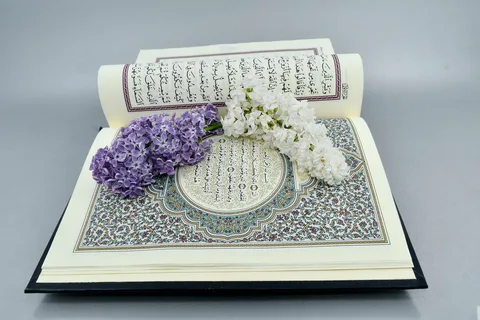In the intricate tapestry of Islamic teachings, one concept stands out prominently — Iman. Derived from the Arabic root word ‘amana,’ meaning belief or faith, Iman in islam is the bedrock upon which the entire Islamic faith is built. in This article on Arabian Tongue website explores the multifaceted dimensions of Iman, its pillars, challenges, and the role it plays in the daily lives of Muslims.
Definition of Iman in Islam

Iman, in its essence, encapsulates the profound belief in the unseen aspects of Islam. It goes beyond a mere acknowledgment of God’s existence; it involves a deep, unwavering faith in the core tenets of the religion.
Significance of Iman in Islamic Teachings
Iman is not a passive acceptance but an active, living force that guides the believer in their actions, thoughts, and interactions. Understanding its significance is crucial for comprehending the Islamic worldview.
Pillars of Iman

The Pillars of Iman, also known as the Articles of Faith, are fundamental beliefs in Islam that every Muslim is required to accept and affirm. These pillars constitute the core tenets of faith and form the foundation of a Muslim’s belief system. The Pillars of Iman are derived from the Quran and the teachings of Prophet Muhammad. There are six main pillars:
- Belief in Allah: At the heart of Iman lies the fundamental belief in the oneness of Allah. This pillar emphasizes the significance of recognizing God as the ultimate authority and sustainer of the universe.
- Belief in Angels: The belief in angels as messengers of God forms another pillar, highlighting the unseen forces that operate in the cosmic realm.
- Belief in Divine Books: Iman extends to accepting the divine books revealed by Allah, including the Quran, Torah, Bible, and others, as sources of guidance.
- Belief in Prophets: Prophets play a crucial role in Iman, serving as conduits for divine messages and embodying righteous behavior.
- Belief in Divine Decree (Qadr): Iman entails accepting that everything, whether perceived as good or bad, happens by the divine will of Allah.
- Belief in the Day of Judgment: The concept of accountability in the afterlife is central to Iman, motivating believers to lead righteous lives.
The Concept of Iman in Daily Life
Iman, often translated as faith or belief, holds significant importance in Islam. It is a central concept that influences the daily lives of Muslims. Iman goes beyond mere intellectual acceptance; it encompasses both belief in the heart and outward actions that reflect that belief. Here’s how the concept of Iman manifests in daily life:
- Belief in the Unseen: Muslims believe in the existence of Allah, angels, revealed books (such as the Quran), prophets, the Day of Judgment, and divine preordainment. This belief in the unseen shapes their worldview and influences decision-making.
- Worship and Rituals: Muslims engage in daily acts of worship, such as the five daily prayers (Salah), fasting during the month of Ramadan (Sawm), giving to charity (Zakat), and performing the pilgrimage to Mecca (Hajj). These rituals are expressions of faith and submission to Allah.
- Morality and Ethics: Iman guides Muslims in their ethical conduct and moral behavior. The teachings of Islam, derived from the Quran and the Sunnah (sayings and actions of Prophet Muhammad), provide a framework for ethical decision-making in various aspects of life.
- Patience and Gratitude: Believers are encouraged to practice patience (Sabr) in the face of adversity and express gratitude (Shukr) during times of prosperity. These attitudes reflect a deep trust in Allah’s wisdom and a recognition of His role in shaping individual destinies.
- Seeking Knowledge: Islam encourages the pursuit of knowledge. Muslims are urged to seek knowledge from cradle to grave. The Quran emphasizes the value of knowledge, and Prophet Muhammad said, “Seeking knowledge is obligatory upon every Muslim.”
- Community and Brotherhood: Iman fosters a sense of brotherhood and sisterhood among Muslims. The community (Ummah) is considered an integral part of one’s faith, and individuals are encouraged to support and care for each other.
- Integrity and Truthfulness: Iman encourages honesty and truthfulness in all dealings. Muslims are advised to be trustworthy, fulfill promises, and adhere to ethical standards in business and personal relationships.
- Dua (Supplication): Believers are encouraged to make supplications to Allah, seeking guidance, forgiveness, and blessings. This constant connection through prayer strengthens the bond of Iman and reliance on Allah.
- Gratitude for Blessings: Recognizing and expressing gratitude for the blessings one has is an important aspect of Iman. Gratitude is not only expressed through words but also through actions that reflect an appreciation for the gifts provided by Allah.
- Tawakkul (Trust in Allah): Iman instills trust in Allah’s plan. Muslims are taught to make efforts and take necessary precautions, but ultimate trust lies in Allah. This trust in His wisdom provides comfort and resilience in facing life’s challenges.
Strengthening Iman
- Prayer and Its Role: Regular prayers act as a direct connection with Allah, fostering a sense of humility and dependence on the divine.
- Recitation of Quran: Engaging with the Quran nourishes Iman, providing spiritual sustenance and guidance for life’s challenges.
- Seeking Knowledge: Continuous learning about Islam enhances Iman, equipping believers with a deeper understanding of their faith.
- Acts of Kindness and Charity: Iman flourishes through acts of kindness and charity, reinforcing the importance of compassion and generosity.
Challenges to Iman
Iman is not immune to doubts, and addressing questions with knowledge and contemplation is essential for its resilience. External factors, including societal pressures, can challenge Iman, requiring steadfastness in one’s faith. Inner conflicts and personal challenges can test Iman, emphasizing the need for self-reflection and perseverance.
Famous Quotes on Iman
Numerous quotes from Islamic scriptures, scholars, and leaders emphasize the importance of Iman (faith) in the life of a Muslim. Here are some famous quotes on Iman:
- Quranic Verse (Surah Al-Baqarah 2:197): “And take provisions, but indeed, the best provision is Taqwa (piety, righteousness). So fear Me, you who are understanding.”
- Prophet Muhammad (peace be upon him): “Faith (Iman) is to believe in Allah, His angels, His books, His messengers, the Last Day, and to believe in the divine destiny, both the good and the evil.”
- Prophet Muhammad (peace be upon him): “None of you has faith until he loves for his brother what he loves for himself.”
- Prophet Muhammad (peace be upon him): “The strong believer is better and more beloved to Allah than the weak believer, while there is good in both.”
- Prophet Muhammad (peace be upon him): “When one of you sees a person who has been endowed with more in the matter of wealth or physical strength, he should look at the one who has been placed at a lower level than himself.”
- Prophet Muhammad (peace be upon him): “The example of a believer is like a fresh tender plant; from whichever direction the wind blows, it bends the plant. But when the wind dies down, it straightens up again.”
- Imam Al-Ghazali: “The beginning of steadfastness (firmness of faith) is the abandonment of whims.”
- Imam Al-Ghazali: “Faith is a tree, the seed of which is in the heart. The water of that tree is consciousness. Its branches are the actions. The fruit of it is certification. So, if the seed is not watered, it will not sprout. If the tree is not firm in its place, it will not stand. If the consciousness dries up, the tree will not bear fruit.”
- Imam Ibn Qayyim: “A friend cannot be considered a friend until he is tested on three occasions: in time of need, behind your back, and after your death.”
- Caliph Umar ibn Al-Khattab (may Allah be pleased with him): “Take account of yourselves before you are taken to account. Weigh your deeds before they are weighed.”
- Imam Ali ibn Abi Talib (may Allah be pleased with him): “Knowledge enlivens the soul.”
These quotes reflect the holistic nature of Iman, emphasizing not only belief in the unseen but also the practical manifestations of faith in one’s character, actions, and interactions with others. They serve as guidance for Muslims seeking to deepen their faith and live according to Islamic principles.
FAQs
What is the significance of Iman in Islam?
Iman holds profound importance as the foundation of Islamic belief, shaping a believer's worldview and actions.
How can I strengthen my Iman?
Strengthening Iman involves regular prayers, Quranic recitation, seeking knowledge, and engaging in acts of kindness.
What challenges can affect one's Iman?
Doubts, external influences, and internal struggles are common challenges that can impact an individual's Iman.
Is Iman the same in different Islamic traditions?
While the core pillars are universal, various Islamic traditions may emphasize certain aspects of Iman differently.
How does Iman contribute to personal growth?
Iman contributes to spiritual and emotional growth, providing a framework for personal development.
conclusion
In conclusion, Iman serves as the cornerstone of Islamic belief, guiding individuals towards a meaningful and purposeful life. Encouraging believers to nurture and strengthen their Iman is vital for personal fulfillment and collective harmony.


